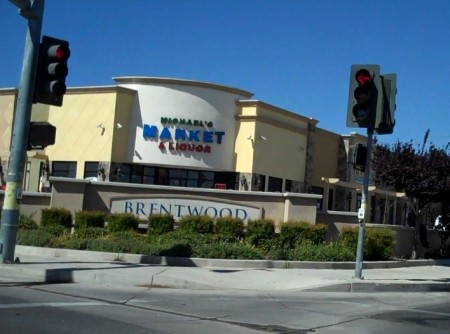
The richness of Victorville’s fossil record never fails to surprise an amateur scam-historian like myself. See, all this time I thought I had been living in a brand new tract home development built on the virgin sands of the Mojave Desert, when in reality my McMansion has been sitting on a sacred Reaganomics burial ground, atop an older civilization, a failed scam-settlement established at the very tail end of the S&L-fueled real estate boom that swept over the nation in the 1980s.
When I moved out to Brentwood—that’s right suckas, I live in Brentwood, CA, the name of my development in Victorville, and that’s what I tell all the ladies I meet—I was sure that it was no more than five or six years old. According to official county records, my house was built in 2004 and sold that same year for $241,000. Most of the homes around me were built and sold at that time, too. And since Brentwood is what they call a “master-planned community,” a plug-n-play neighborhood built around a park and school and featuring the same basic home layouts, I figured the whole thing broke ground at most a year or two before that.
Then I discovered Google Earth’s “historical imagery” function. I zoomed in on Brentwood and moved the slider all the way back to the 90s, expecting to see nothing but bland monotone desert in place of Brentwood’s McMansion sprawl. But I saw a familiar sight instead: the outline of neat streets curving around a park/playground core. Some of the roads looked paved, others just graded, and a cluster of homes was already radiating out from the center.
I couldn’t believe it, but it was true. The satellite image was snapped in May 1994 (as far back as Google Earth allowed), and already my neighborhood had starting to fill in.
Moving the slider forward showed no change in the neighborhood for nearly a decade. The next image is in 2005 and shows Brentwood suddenly springing to life, it suburban skeleton filling out with paved streets and actual homes.
It was clear that Brentwood had stalled, probably abandoned sometime before 1994. But what was it doing here in the first place? Wasn’t America still in the grip of a major recession?
Digging through Victorville’s fossil record, I found out that the origins of Brentwood could be traced back to somewhere between 1990 and 1991, when a developer called Pacific Bay Properties decided to go down in history as the company that laid down Victorville’s biggest “master-planned community,” a wholesome prefab neighborhood with grassy lawns, a power-walking trail, an elementary school and a couple of shopping areas.
The real estate developer behind Brentwood wasn’t just some generic smalltime builder that came late to the game. Pacific Bay Properties was actually a second-tier subsidiary of Ford Motor Company. In the coming years, the Brentwood development would rack up $7 million just in back-taxes to the city of Victorville.
But Ford probably wasn’t worried about being held liable for Pacific’s debt. See, Pacific Bay Properties was a second-tier subsidiary of Ford. The “second-tier” is the important thing here. This kind of corporate relationship provides a buffer between the Ford Motor Company mother ship and the Pacific Bay scammer drone it sends out to do the dirty business–a relationship taken right out of the mafia playbook. The second-tier subsidiary is like corporate version of a foot soldier, who never interacts with the boss but gets all of its orders from the capo. This way, the foot soldier can go out and stomp, beat, racketeer, extort and pretty much do whatever he has to, leaving the Boss looking squeaky clean. In the case of Pacific Bay Properties, the developer can take out all sorts of huge loans and get municipal bond financing that it can’t pay back, and default on them as much as it wants, without hurting Ford’s core business.
Victorville saw a whole lot of people–developers and homeowners–defaulting on their loans back then. Just like this time, the real estate rush of the 80s had greedy developers and speculators pimping out the cheap land of Victorville and the High Desert to as many homebuyer-suckers as they could cheat, right up until that bubble burst.
Here’s a New York Times article, published just a few years after Brentwood came into existence, spotlighting the effects of the real estate crash here:
Victorville Journal; Boom to Bust in the Distant Suburbs
By SETH MYDANS,
Published: Thursday, February 9, 1995Victorville and the other towns in Victor Valley — Hesperia, Apple Valley and Adelanto — are about 100 miles northeast of downtown Los Angeles. They were fed by the economic boom of the 1980’s when people were willing to drive two hours or more over the mountains to their jobs in exchange for a modest home with a lawn and a two-car garage.
The recession of the 1990’s left the towns stranded here in the Mojave Desert, with many residents ready to flee farther east, out of California altogether, but they are burdened with homes they cannot sell. As many as 300 houses are put up for sale every week in Victor Valley, said Gene Binsbachar, executive vice president of the Victor Valley Association of Realtors. The backlog of unsold houses is now up to 3,500 in the valley, still home to about 250,000 people.
The local economy suffered an added blow with the closing two years ago of George Air Force Base on the edge of town, with the loss of 5,000 jobs. Political wrangling has delayed redevelopment of the base, with plans for a prison, a civilian airport and small industries still on the drawing board.
In recent months, economic statistics indicate that the area has felt the first warm breath of the upturn that has tentatively begun in Los Angeles and Orange Counties. But few people here said they had noticed. “For Sale” signs still swing in the breeze on nearly every street, almost as numerous as the spiky Joshua trees that are the flora of the high desert.
Read more: bubble city, ford, lehman, reagonomics burial ground, speculation, subprime city, suncal, victorville, Yasha Levine, Dispatch


Got something to say to us? Then send us a letter.
Want us to stick around? Donate to The eXiled.
Twitter twerps can follow us at twitter.com/exiledonline















10 Comments
Add your own1. Sin Fronteras | August 11th, 2009 at 1:37 pm
‘Look above my head. Up. What do you see?’
Myra gazed southward and upward.
‘Top of the Two Mile Tower?’
‘Right. Know what’s in it? Squatters, mostly. Damn thing near built itself, like a stone tree. But the builders couldn’t find enough business to rent work-space in it.’
‘That sort of thing’s common enough,’ Myra said. ‘Spectacular buildings are usally finished just before the recession hits, and stay empty until the next boom.’
‘If there is another boom…’ Sadie sade gloomily.
2. Sin Fronteras | August 11th, 2009 at 1:39 pm
“Sadie sade” is mow in my top 10 typos.
3. Hendrik van de Meulen | August 12th, 2009 at 11:11 am
Yasha, I have these weird fantasies that I’m from a master race, yet all I can think about is ass-raping my little cousins and playing a banjo. What’s it all mean?
4. Tommy Jefferson | August 12th, 2009 at 1:13 pm
Instead of watching for companies who profit from real estate bubbles, the general public should stamp out the government which creates such bubbles.
No government economic manipulation equals no bubble, and no suffering from bubble-pop.
But then, Americans do love voting for the use of government violence to extract sustinence from other people, and that requires central planning and economic manipulation.
5. Mr. Wiggles | August 12th, 2009 at 6:42 pm
Everyone ready? I’m about to try to make a funny, watch: Can you connect Victorville to the health care crisis as well? Oh wait, that’s your other article about fast food–
6. KludgeHopper | August 13th, 2009 at 5:45 am
@4: Wow, libertarian blubbering complete with “central planning”. Good boy.
@5: Wow, you almost seem to have figured out the symbolism of Victorville.
7. aleke | August 16th, 2009 at 12:49 pm
@4 lol, yeah, feudalism IS more stable
8. Matt S. | August 17th, 2009 at 4:49 am
Now this is a better article without the political drivel.
9. twentyeight | August 20th, 2009 at 11:40 pm
@4 & 5 & 8: hey, do you know why you don’t have the runs right now? it’s because the gov’t makes sure the water is clean.
Just something to think about.
10. ecofeco | September 9th, 2009 at 12:13 am
It’s fucking desert! People who buy desert land get what they deserve.
Yasha, tell me you didn’t buy!
Leave a Comment
(Open to all. Comments can and will be censored at whim and without warning.)
Subscribe to the comments via RSS Feed